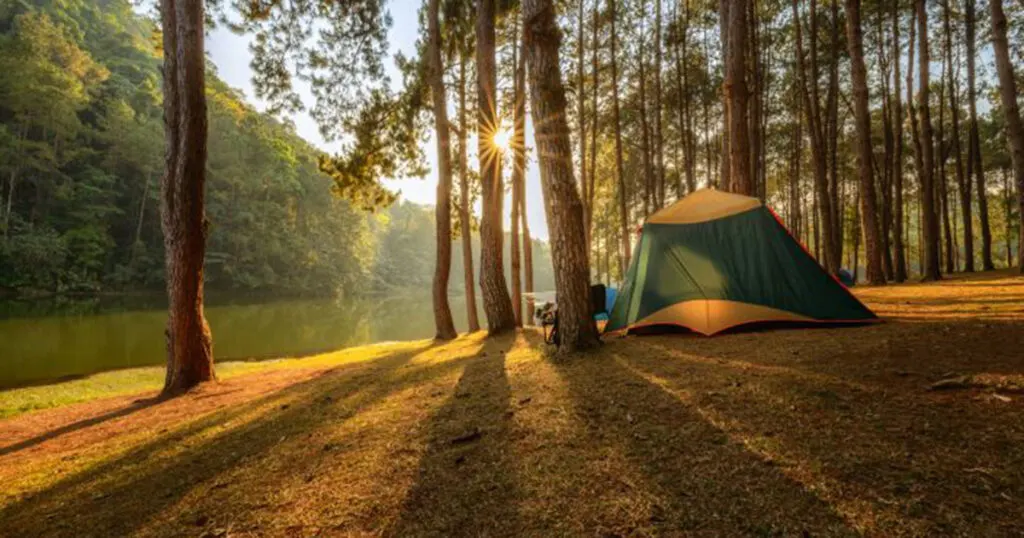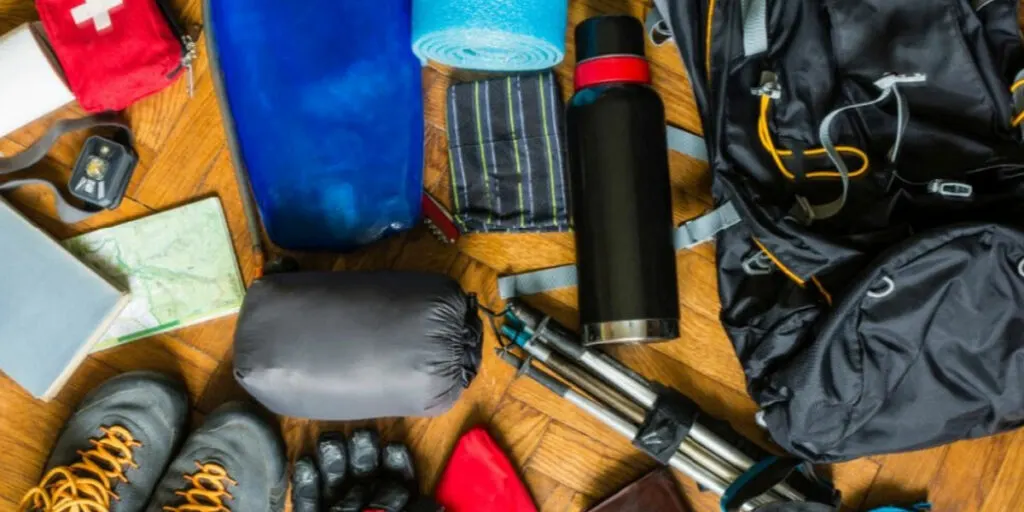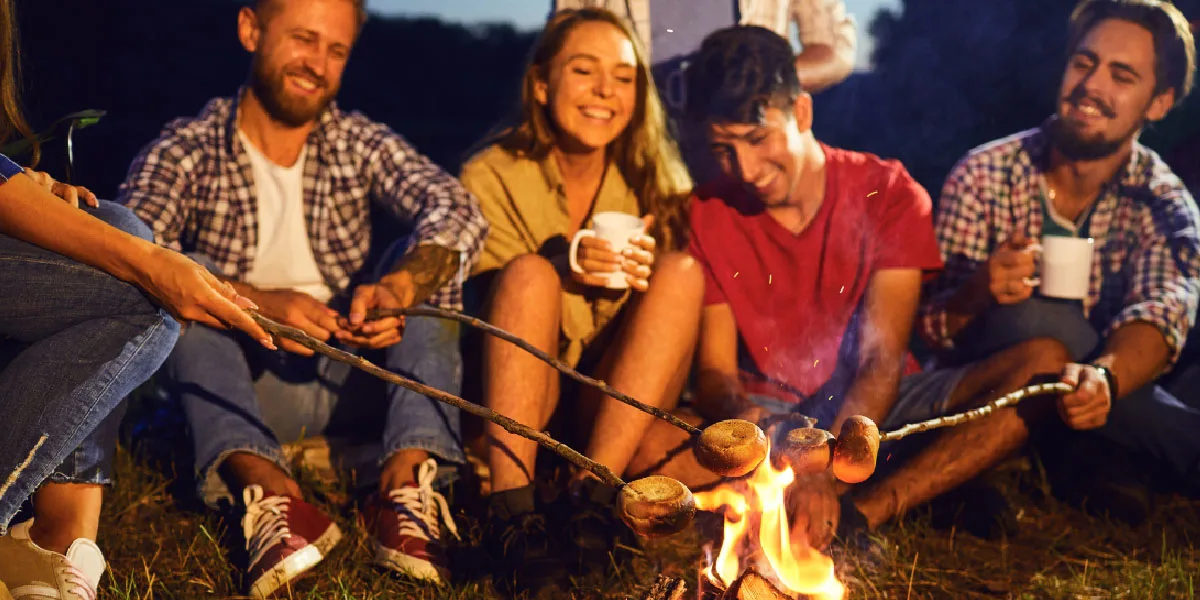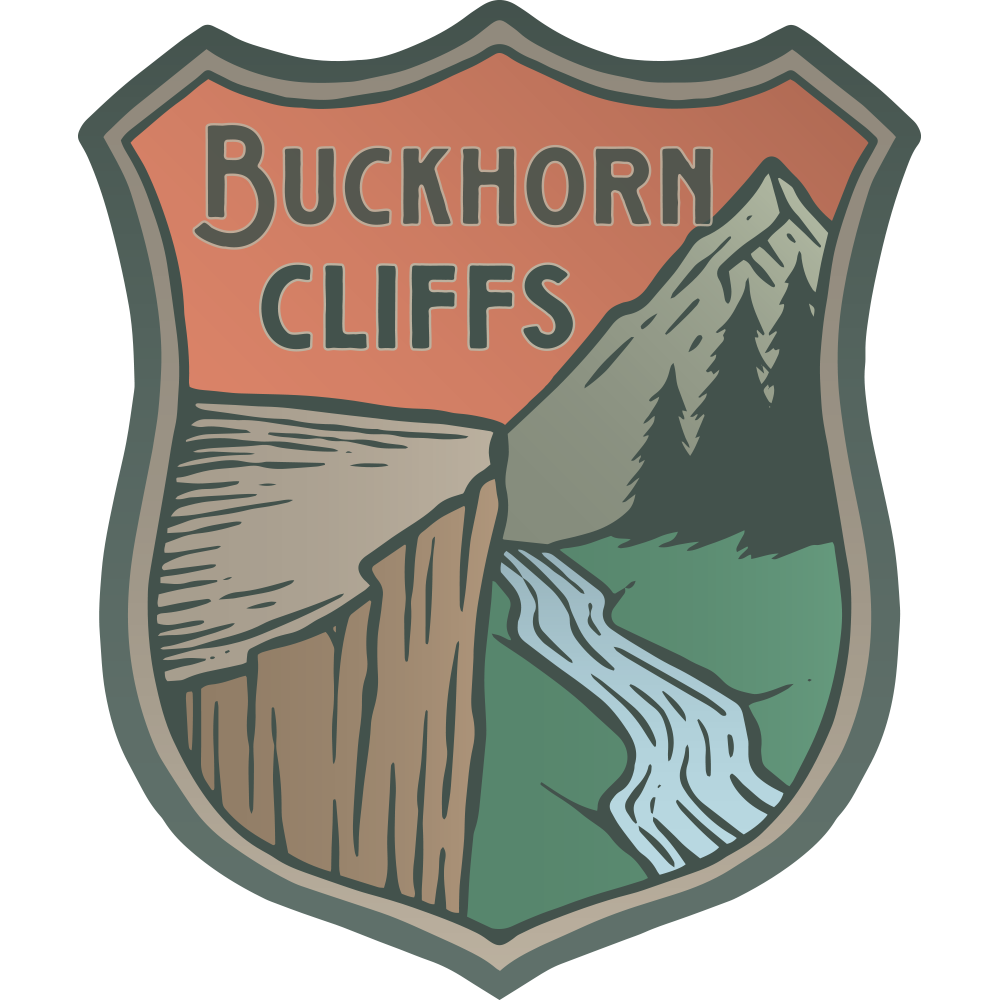Embarking on your first camping trip can feel like standing at the edge of an enchanting forest – it’s thrilling, filled with the promise of adventure, yet slightly intimidating.
After all, the great outdoors is a vast, unpredictable place, and the thought of leaving behind the comforts of home for a tent and a sleeping bag can be daunting for beginners.
But fear not, intrepid explorer! With the right preparation, your first foray into the wilderness can be a memorable, joy-filled journey.

This guide is designed to equip you with the knowledge and confidence you need to step into nature’s embrace, ready to create your own tales around the campfire. So, let’s get started, shall we? After all, the stars are waiting, and the crackling fire is calling your name.
Understanding the Basics of Camping
Camping is a timeless adventure, a chance to disconnect from the digital world and reconnect with nature. For a beginner, it might seem like a daunting task, but with the right knowledge, it can be an enriching experience that leaves you yearning for more.
There are various types of camping, each offering a unique experience. From backpacking, where you carry everything you need on your back and hike to different campsites, to RV camping, where you bring the comforts of home on the road, to the classic tent camping, where you pitch a tent and enjoy the simplicity of nature. Understanding these types can help you decide what suits you best.
Camping is more than just setting up a tent and lighting a fire. It’s about immersing yourself in the great outdoors, learning new skills, and creating lasting memories. It’s about the thrill of waking up to the sound of birds chirping, the smell of dew on the grass, and the sight of the sun rising over a serene landscape. It’s about the stories shared and the bonds formed around the campfire.
Planning Your First Camping Trip
Planning is crucial for a successful camping trip. It helps you anticipate and prepare for the challenges you might face, making your first camping trip a memorable one.
Choosing the right time and location is the first step. Consider the season, weather conditions, and the type of campsite that suits your needs. Some campsites offer amenities like restrooms and showers, while others are more rustic. Websites like Recreation.gov can help you find and reserve campsites.
Researching the area and campsite amenities is also important. Knowing what facilities are available, the rules of the campsite, and the attractions in the area can help you prepare better.
Essential Camping Gear for Beginners

Having the right camping essentials can make your camping experience comfortable and enjoyable. Here are some essentials:
Tent: Your tent is your home away from home. Choose one that is easy to set up, durable, and suitable for the weather conditions you’ll be camping in. Practice setting it up at home before your trip.
Sleeping essentials: A good sleeping bag and sleeping pad are crucial for a good night’s sleep. Choose a sleeping bag suitable for the expected temperatures, and a sleeping pad for insulation and comfort.
Cooking equipment: A portable stove, fuel, pots, and utensils are essential for cooking meals. Don’t forget a cooler for storing perishables.
First aid supplies: A first aid kit is a must-have. It should include bandages, antiseptic wipes, tweezers, medical tape, and any personal medication.
Preparing a Camping Checklist
A key part of ‘How to Prepare for Your First Camping Trip‘ is creating a comprehensive camping checklist. Having a camping supplies checklist ensures you don’t forget anything important. It should include all your gear, food, clothing, and personal items. Check the weather forecast before you pack, and adjust your clothing and gear accordingly.
Packing and Setting Up Camp
Now that we’ve covered the basics in ‘How to Prepare for Your First Camping Trip’, let’s move on to packing and setting up your camp.
Organizing your equipment makes packing and setting up camp easier. Pack your gear in a way that makes it easy to find and access.
Packing a cooler properly can keep your food fresh longer. Pre-chill your cooler, use plenty of ice, and pack your food in a logical order.
Once you arrive at your campsite, set up your tent first. This gives you a sheltered space to store your gear and provides a place to rest whenever you need it.
What to Wear and Do During Your Camping Trip
Embarking on a camping trip is not just about where you go or what you bring; it’s also about what you wear and what you do. Here’s a guide to help you make the most of your outdoor adventure.
Dress for Success
When it comes to camping, the right attire can make a significant difference in your comfort and enjoyment. Here are some tips:
- Layer Up: Weather in the outdoors can be unpredictable. Dress in layers to easily adjust to changing temperatures. Start with a moisture-wicking base layer to keep you dry, add an insulating middle layer for warmth, and finish with a waterproof outer layer for protection against rain or wind.
- Choose the Right Materials: Opt for materials that are quick-drying and moisture-wicking, like synthetic fabrics or wool. Avoid cotton as it takes a long time to dry when wet, which can be uncomfortable and potentially dangerous in cold conditions.
- Protect Your Feet: A good pair of hiking boots or shoes is essential. They should be well-fitted, comfortable, and suitable for the terrain you’ll be exploring. Don’t forget moisture-wicking socks to keep your feet dry.
- Accessorize: A hat can protect you from the sun in summer and keep you warm in winter. Gloves can be useful in cold weather, and a sturdy pair of sunglasses is essential for protecting your eyes from the sun’s glare.
Activities to Enjoy
Camping offers a plethora of activities to enjoy, allowing you to connect with nature and make lasting memories. Here are some ideas:
- Hiking: Exploring the trails is a great way to immerse yourself in the natural beauty of your surroundings. Remember to wear appropriate footwear, bring a map or trail guide, and pack plenty of water and snacks.
- Bird Watching: Camping provides a unique opportunity to observe wildlife. Bring a pair of binoculars and a bird guide to identify different species.
- Fishing: If your campsite is near a lake or river, fishing can be a relaxing way to spend your time. Check local regulations about licenses and catch limits.
- Photography: The great outdoors offers stunning landscapes, unique wildlife, and beautiful sunrises and sunsets. Capture these moments with your camera or smartphone.
- Stargazing: Far from city lights, a campsite can offer a clear view of the night sky. Bring a star chart or use a stargazing app to identify constellations.
Camping Etiquette and Safety
Respecting nature and fellow campers is an essential part of the camping experience. Here are some tips:
- Leave No Trace: Preserve the beauty of nature by packing out all trash, staying on trails, and not disturbing wildlife or plants.
- Respect Quiet Hours: Most campsites have quiet hours to ensure everyone can enjoy the peace of the outdoors. Keep noise levels down during these times.
- Fire Safety: Follow all fire regulations, never leave a fire unattended, and always fully extinguish it before leaving your site or going to sleep.
Tips for First-Time Campers

Embarking on your first camping trip can be an exciting yet intimidating experience. Here are some tips on how to prepare for your first camping trip and to help you navigate this new adventure with confidence and ease.
Arrive Early
One of the most common mistakes first-time campers make is arriving late at their campsite. This can lead to setting up camp in the dark, which is not an ideal situation, especially for beginners. Arriving early gives you plenty of daylight to set up your tent, explore the campsite, and settle in before nightfall.
Don’t Overpack
It’s easy to want to bring everything but the kitchen sink on your first camping trip, but overpacking can lead to a cluttered campsite and extra weight to carry. Stick to the essentials and remember that part of the joy of camping is living simply.
Store Food Properly
Improper food storage can attract wildlife to your campsite. Always store your food in airtight containers and keep it in your car or a designated bear box, if available. Never leave food out in the open or in your tent.
Respect Nature
Remember, when you’re camping, you’re a guest in nature’s home. Respect wildlife by observing from a distance and not feeding animals. Stick to trails to avoid damaging plants, and always pack out what you pack in, leaving the campsite as you found it.
Learn Basic First Aid
Knowing basic first aid can come in handy in case of minor injuries or emergencies. Consider taking a first aid course or at least familiarizing yourself with basic procedures.
Practice Setting Up Your Gear
Before you go camping, practice setting up your tent and using your camping stove. Familiarity with your gear can make your camping experience smoother and more enjoyable.
Dress Appropriately
Weather in the great outdoors can be unpredictable. Dress in layers so you can adjust to changing temperatures, and don’t forget to pack rain gear, even if the forecast looks clear.
Stay Hydrated and Apply Sunscreen
Staying hydrated is crucial, especially if you’re engaging in physical activities like hiking. Always have a water bottle on hand. Similarly, protect your skin from the sun’s rays by applying sunscreen regularly.
Remember, camping is a learning experience. You’ll likely make mistakes on your first trip, but that’s all part of the adventure. With each trip, you’ll gain more knowledge and become a more confident camper.
Final Thoughts on How to Prepare for Your First Camping Trip
You’re now equipped with the knowledge you need for your first camping trip. Remember, preparation is key, but so is flexibility. Things might not always go as planned, but that’s part of the adventure. So go ahead, step into the wild, and start creating your own camping stories. We can’t wait to hear about your adventures!
Frequently Asked Questions
How do beginners prepare for camping?
Beginners prepare for camping by first understanding the basics of camping, planning their trip, gathering essential gear, and preparing a checklist. They should research their chosen campsite, practice setting up their tent and using their gear, and pack appropriately for the weather and activities they plan to do. It’s also beneficial for beginners to learn basic first aid and familiarize themselves with camping etiquette and safety.
What to expect on your first camping trip?
On your first camping trip, you can expect to learn new skills, connect with nature, and face unexpected challenges. You’ll likely be setting up a tent, cooking outdoors, and navigating unfamiliar terrain. There may be weather changes, wildlife encounters, and other unforeseen situations. However, with proper preparation and a positive attitude, these challenges can become memorable parts of the adventure.
What is the first rule of camping?
The first rule of camping is to respect nature, often encapsulated in the “Leave No Trace” principle. This means preserving the natural environment by not disturbing wildlife or plants, staying on trails, packing out all trash, and leaving the campsite as you found it. It’s about ensuring that the beauty of the outdoors can be enjoyed by others for years to come.
